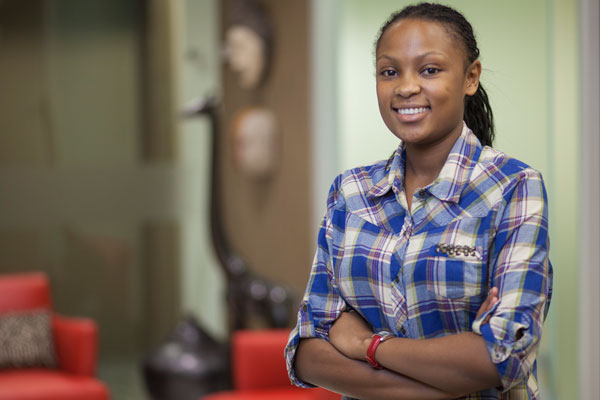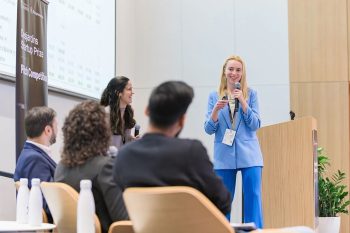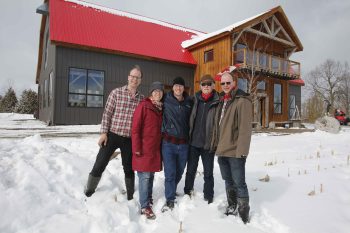This story is adapted from an article written by Cynthia MacDonald in Re:New, the New College Alumni & Friends Magazine 2015.
Sylvia Mwangi, a second-year U of T Engineering student, was raised in the mountainous central highlands of Kenya, and developed a passion for science and math early on. But in sub-Saharan Africa, where education beyond high school is rare, her odds of being able to fulfill her ambitions were low.
Fortunately, Mwangi discovered an initiative that could help her do just that. While interning at a bank in Nairobi, she learned about the MasterCard Foundation Scholars Program, which has given her the education that had once seemed unlikely.
The MasterCard Foundation has committed $500 million over ten years to provide disadvantaged students, primarily from sub-Saharan Africa, the opportunity to study at universities around the world. In addition to covering tuition and books, MasterCard also supports Mwangi’s living expenses, and helps her source internship, volunteer and social activities. She is now in her second year with the program, and one of 23 such Scholars currently studying at U of T.
With 60% of its citizens under the age of 25, sub-Saharan Africa is rich with the potential and promise of youth. Unfortunately, fewer than 7% are ever educated beyond high school. Within that small group, far fewer than half are female. Which is why brilliant students like Sylvia Mwangi are true trailblazers.
Now in residence at New College and studying industrial engineering, she also considered programs in law or pharmacy. But as a result of her experience in Toronto, she is newly motivated by the prospect of working in health care or the relatively new area of oil and gas exploration back home.
“I’m not just interested in mining, but in community development,” she says. “How do we make sure we give back? We must always remember that the resources belong to the people, and that they should see benefits, too.”
Giving back is a theme that recurs in conversation with Mwangi. A key program requirement is that she will spend the summer after her third year interning in her home country. After graduation, her ultimate plan is to return to where she came from.
This is no small point, as sub-Saharan Africa suffers from a “brain drain”: for example, even though few people living there can take advantage of medical training, in many African countries, the majority of locally-trained doctors ultimately take their skills elsewhere — instead of staying home where they are often badly needed.
This situation reflects both the good and bad news emanating from countries like Kenya. On the one hand, government funding and newly booming economies have resulted in greater school enrollment at early levels (the MasterCard Foundation also funds secondary education). But lacking teachers, school buildings, transportation and money for school fees, there is a limit to how far education can currently go for most students. This is especially true for girls, who are often forced to give up school in favour of domestic responsibilities.
So it is up to the brightest of these students to create change. Because Canada has a well-established mining industry, Mwangi knows that many in the burgeoning resource sector in Kenya can profit from the lessons she will bring back from her classwork and internships. In a way, teaching her means teaching many other Africans as well.
“Canada has the resources, and we students have the skills,” she says. “This program gives a perfect opportunity to match the two. I really look forward to going home and sharing what I’ve learned.”
MasterCard Foundation Scholars are also offered counselling and mentorship, to help her adjust to the culture and climate shock of their home away from home. Though she’d never travelled from her infinitely warmer homeland before, she didn’t have much trouble fitting in.
Gregarious, kind and funny, she’s adjusted easily to her “home away from home” (while admitting she could certainly do without the cold of winter). On top of studying and volunteering, Mwangi has tried her hand at martial arts and leadership opportunities through the Rotoract Club.
She has found Canada to be safe and friendly, and appreciates the range of viewpoints on offer in a diverse city like Toronto. This is something Mwangi has absorbed through the frequent group work in her engineering classes, something she’d never done in Kenya: “That was a whole new concept for me,” she says.
Mwangi has already learned a great deal in Canada — but Canada has much to learn from her, too. Her courageous journey is a powerful reminder that North Americans should never be complacent, bored or cynical about the rewards of education. And that even a young person is capable of taking on the biggest challenges.



